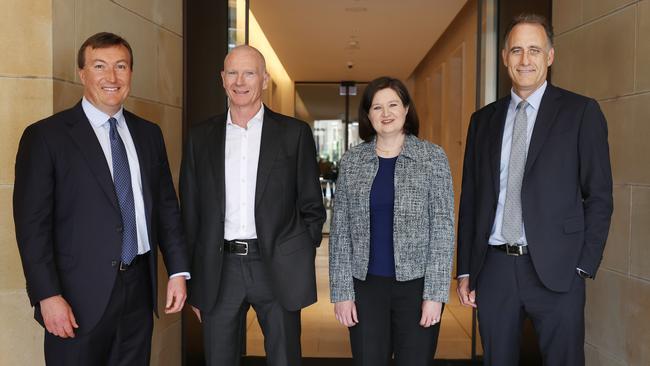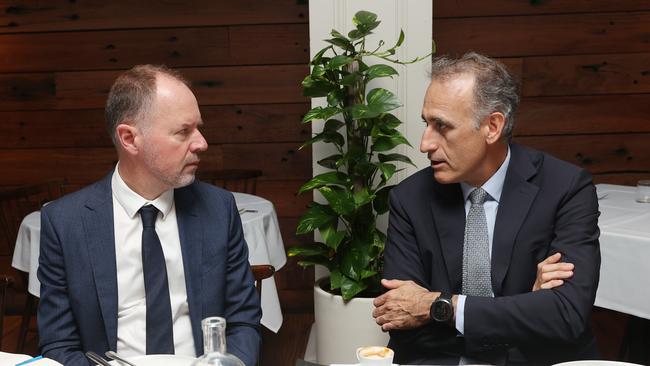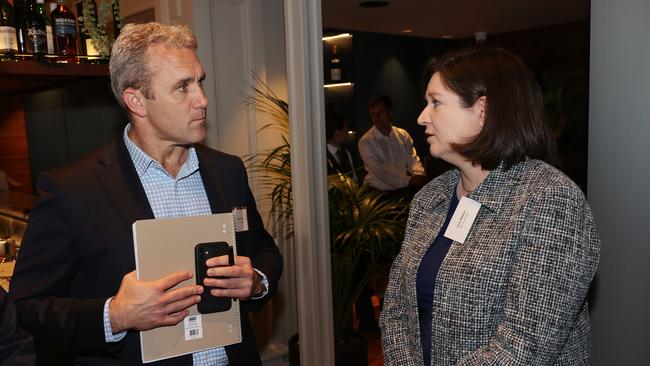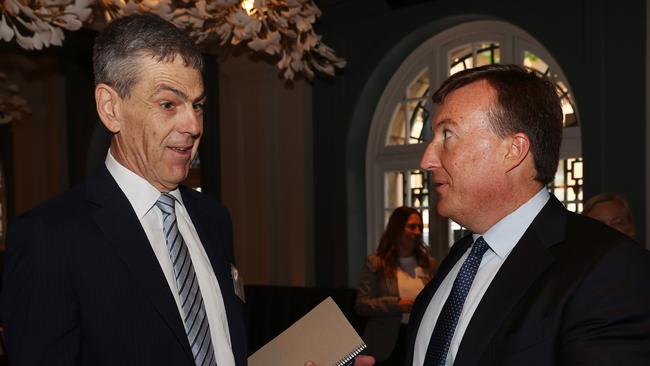‘We can easily turn into the unlucky country’: Rob Scott and CEOs’ stark productivity warning
Rising crime and poor health outcomes have been triggered by sagging productivity and the tough economic environment, CEOs warn as they call for a ‘Team Australia’ approach on policy.

Rising regulation and a stifling climate to invest and do business risk putting Australia on the road to becoming the “unlucky country”, marked by lower living standards, poorer job prospects and less opportunity.
Three business leaders have issued a stark warning of the damage being done to Australia as successive governments have all-but-abandoned the landmark reform agenda of the 1980s, through to the early 2000s.
Unchecked growth of the public sector and ever-increasing red tape on businesses of all sizes are starting to have a serious impact on the nation’s economic prospects, they warned at a roundtable hosted by The Australian and Business Council of Australia examining productivity and competition in the economy.
Rising crime and poor health outcomes have also been triggered by sagging productivity and the tough economic environment, the business leaders said.
Wesfarmers chief executive Rob Scott, BP Australia president Lucy Nation and the boss of listed global medi-tech player Cochlear, Dig Howitt, called for bold productivity-boosting reforms to be put back on the national agenda, to help rebuild a more dynamic and competitive economy.

Mr Scott, whose company is one of Australia’s biggest employers with retail brands including Bunnings, Kmart, Officeworks and Priceline, said the millions of people who came through his stores each week were feeling the pinch from cost-of-living pressures and affordability of housing.
Sagging productivity represents a direct hit on living standards and adds to sticky inflation, Mr Scott warned, and as living standards eroded, this threatened to fundamentally test the social cohesion of the nation.
“The difference between 2 per cent productivity growth, which is what we were experiencing decades ago, back when we were referred to as the lucky country, can very quickly turn us into the unlucky country when we’re at 0.5 per cent productivity growth (today),” he told the roundtable. “It’s not surprising that when people are doing it tough financially and feel like they’re falling behind, we do see impacts to health and crime, which ultimately do go to the fabric of our society”.
The more governments allowed Australia to slip behind on many global economic and social measures, it would become harder to break out of a low-growth cycle, the chief executives said.

Australia has recorded one of the worst productivity performances among developed world economies since the Covid pandemic, and has underperformed the long-term average over the past decade. Compounding this, foreign investment – an important source of wealth – has largely flatlined in the past five years.
The re-election of Donald Trump, who has promised to slash government regulation and cut taxes across the board from next year, is expected to trigger a wave of investment in the US. The corporate tax rate is currently at 21 per cent compared with 30 per cent in Australia.
Mr Scott said tax reform needed to be comprehensive and include the states, by tackling stamp duty and payroll taxes.
BP Australia president Lucy Nation, who is overseeing a multibillion-dollar rollout of renewable projects here from the UK-listed energy giant, called for a “Team Australia” moment to change the trajectory of Australia’s current path. “It’s also understanding that we’re in a global race at the moment,” Ms Nation told the roundtable.
She said the 2020s were going to be a “pivotal decade” with the rest of the world staking out ground on energy transition and security, artificial intelligence, education and demographics.
“I think we’ve got a really important window over the next three to five years of how Australia positions ourselves for the next 40 to 50 years,” she said. “We need to not be complacent, and we need to understand as Team Australia, how do we derisk and give certainty to really attract the capital flows. We are resource rich for energy transition, but capital poor, and it’s going to take a huge amount of foreign direct investment, and other countries are competing for that too.”

A BCA position paper on productivity found Australia was becoming a more difficult, complex and expensive place to do business, which had seen the economy slip down rankings of global competitiveness. This had contributed to our living standards – measured by real household disposable income per person – falling to 2014 levels. Countries such as the US, Qatar, Singapore, Sweden and Ireland had overtaken Australia in recent years. HSBC Australia chief economist Paul Bloxham said: “Lifting productivity … is the only way that living standards can be lifted in the medium term.”
Big reforms of past decades – from the floating of the dollar, adding more flexibility into labour markets, national energy and competition policy, inflation targeting and the GST – have all contributed to Australia’s current wealth. But the roundtable was told more needed to be done in reforming the patchwork of state-based and increasing business taxes such as payroll, freeing up planning and approvals while restoring the link of wage rises to productivity gains.
At the same time, new regulations – state and commonwealth – needed to be considered in terms of cost to the economy and how they worked with existing rules.
BCA chief executive Bran Black said: “We need to look to genuine plans to reverse that trajectory and start putting us on a different track I hope that because there is a broader receptiveness for the need for longer term change and recognition that there is something of a burning platform that we are on.”

Mr Howitt, whose bionic ear implant company generates the bulk of its sales offshore, said Australia had an important choice ahead of it. “We see in Europe, regulation has been consistently rising over the years and stifling productivity,” he said. “At the same time, the US has been going up as a much easier place to invest in and to go to market and to employ people. We’re seeing those two significant parts of the world are going in quite different directions. We’ve been following more of the Europe path, more recently, of adding regulation, both in on labour but more broadly, don’t think there’s been any serious review of the impact of regulation. Australia has a real choice, and that choice is perhaps even more stark now with Trump having this department of government efficiency.”
Mr Scott said addressing productivity would need a co-ordinated, collaborative approach between business and government.







To join the conversation, please log in. Don't have an account? Register
Join the conversation, you are commenting as Logout